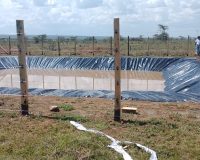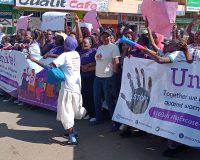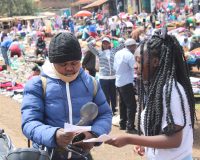Hosea, a 14-year-old from Kirima Ward, is one of numerous children who have been identified as potential beneficiaries of educational assistance from well-wishers. This is a narrative account of his life trajectory and the influence of newly discovered optimism on his life. Hosea is the fourth of seven children born to his parents. His mother died when he was in the second grade.
Hosea’s father is employed in the informal sector as a casual laborer in their village. The loss of his wife had a profound impact on him, resulting in a period of almost four years during which he was unable to provide for his family due to the onset of depression. Throughout this period, the children were supported by the extended family and members of the community who were benevolent and willing to provide assistance. However, the level of support was not always consistent, resulting in lack of enrollment of the children in school due to financial constraints and other associated requirements. The family experienced further distress. The eldest daughter was sexually assaulted during this period of depression. She became a mother at an early age and subsequently left the family home. She was barely eighteen years old when she got married. Hosea’s father has been unable to overcome this issue.
Hosea was introduced to the programme by a teacher patron following his exceptional performance on the Kenya Certificate of Primary Education (KCPE) examinations. He was the most academically proficient student at his school. His exemplary academic performance was duly recognized, resulting in his admission to Baricho High School, a nationally-ranked institution in Kenya. For Hosea, the Kenya Certificate of Primary Education (KCPE) represented the conclusion of his academic pursuits. The school community believed that he required admission to the school, and thus sought assistance from the programme.
The programme facilitated the mobilization of resources within the community, resulting in the acquisition of funds to procure the necessary requirements for Hosea to commence Form One. However, the financial constraints associated with school fees remained a significant barrier to his enrollment, as the partial support provided by the programme was only sufficient to meet a third of his needs. A number of individuals were approached, and one expressed a willingness to assume responsibility for the student’s educational expenses for the entire four year study. Another indicated a commitment to provide the student with personal effects on a termly basis.
In a mentorship and life-skills workshop organized by the program for students supported by the program in secondary school, Hosea articulated the following:
“It is like a dream to have come this far. Completing my primary education and subsequently joining secondary school has entailed considerable challenges. Since the death of my mother, my father has been experiencing significant financial difficulties. Given the financial constraints at home, I have often questioned whether I would be able to pursue my academic aspirations and ultimately achieve my professional objective of becoming a physician. This aspiration is gradually being realized. I will capitalize on this opportunity and on the support, I am receiving from St. Martin and other well-wishers. I would like to express my sincerest gratitude; I am now in possession of all the requisite resources for my academic pursuits. Most importantly, I have been motivated to also contribute to the betterment of the lives of others.





